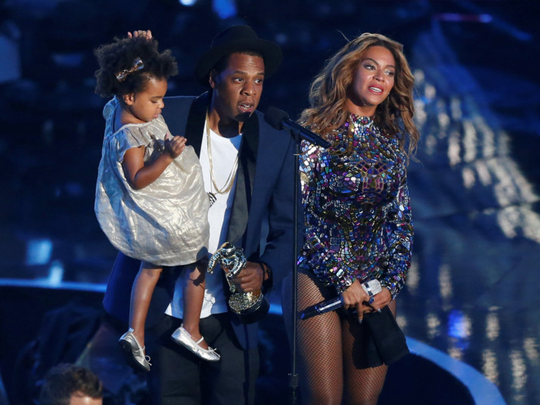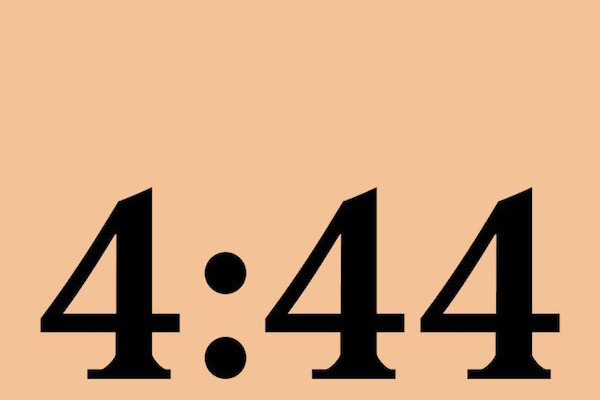
Jay-Z knew it was time to reveal another side of himself. He just needed a palette. More than two decades and 12 albums into one of the most storied careers in hip-hop — and after the seismic pop event that was his wife Beyonce’s visual album Lemonade — Brooklyn rapper born Shawn Carter tried something new: He worked with a single producer to realise his vision.
On 4:44, the focused, revelatory 10-track album he released on Friday, Jay-Z found a partner in veteran Chicago producer No I.D. (real name Dion Wilson), who served as the architect of every beat. Mixing samples from some of Jay-Z’s favourite artists — Stevie Wonder, Nina Simone, the Fugees — with live instrumentation, the producer hit upon a rich, grown-up soul sound that allowed Jay-Z, 47, to look inward and address his much-analysed marriage, fatherhood, generational trauma and the black experience with believable rawness.
“It was a real artist-producer relationship on a traditional level,” No I.D. said, stressing the rarity of an intimate, album-length collaboration in rap. “I think it’s something we need more of in all music. It wasn’t until the mid-90s that we even started this concept of multiple producers on projects.”
4:44 was recorded largely at No I.D.’s Hollywood studio beginning in December and wasn’t finished until very recently (hence the line on Family Feud about Al Sharpton’s viral summer selfies).
“We did that maybe Monday?” No I.D., 46, said with a laugh. “Maybe Tuesday. I finished it Thursday morning.”
Over the phone from Los Angeles, the producer — who was named executive vice president of Capitol Music Group in June — discussed pushing Jay-Z to new emotional places, how he chose samples, the influence of “Lemonade” and BeyoncE’s role in recording. These are edited excerpts from the conversation.
What were your initial conversations like with Jay about what would become 4:44?
He said, “I want to do an album where I talk about the things that I’ve never talked about.” He told me he wanted to open up and give people more. As a producer, I said, “How do I score that thought?” I wanted to see something new happen. We have 12 albums, why 13? I had to know that I could be of assistance to pull things out of him.
What kind of beats did you present to him initially?
I sat with him and played him maybe 70 ideas. After that, every other day I would send him three to four new ideas every morning. He would get on the treadmill and sketch out ideas. That was the core creation process: Conversation, ideas in the morning, treadmill, coming in to talk about it, and then we’d lace something or not lace something. It was almost like a therapy session for all of us.
Jay posted a playlist of songs that inspired 4:44. What were some of the musical touchstones for your production?
I asked him, “What do you listen to? Because I’ll sample some of it.” He gave me this playlist and we began to make pieces of music out of the music that he listened to. My philosophy was scoring his reality, his lifestyle and his taste. He kept adding songs into this playlist, so I made pieces of music out of all of it. I knew it would just keep him going, keep him engaged. Some of the tracks that say they were co-produced by Jay-Z, those are the ones where he gave me the idea of the song (to sample), like Nina Simone’s Four Women (on The Story of O.J.).
Were there specific verses Jay wrote that really hit you?
One that I didn’t see him record that really hit me was obviously 4:44. Me, him and Guru, his (recording) engineer, knew that we didn’t want him to do an album of Lemonade response. We just wanted him to respond and then let it be and still touch on other things. I created that beat to box him into telling that story. I put the sample from the singer Hannah Williams — it starts off with, “I find it so hard/ When I know in my heart/ I’m letting you down everyday.” I remember him hearing it and looking at me like, “OK, fine.”
He went home, wakes up at 4:44 [am] and calls Guru over [to record]. I was blown away. I just walked out of the studio and wanted to go find my wife and hug her. I told him that’s the best song he’s ever written. Everything it covers about being a man, being in a relationship, being a father, how you affect your kids. These things don’t really get touched on in music, especially in hip-hop.
No matter how it came out, this album was always going to be mentioned in the same breath as Lemonade, which really raised the bar in terms of the intimacy listeners expected. Was the impact of that album something you guys spoke about?
No, we never directly spoke about that album. Mainly because if he talks about himself, it’s going to bleed into that regardless. But there’s a difference in talking about it for the sake of response and for the sake of honesty and the truth. The truth needs to explain why you are the way you are, why you did what you did. We know what happened. We got it. But what were the circumstances that led to this and how do you feel about it?
Were you getting outside input as you went along? Was Beyonce coming by the studio?
I always call Bey our de facto A&R. Pillow talk is the strongest conversation on the planet. Every song has to get past her ears, in my eyes. She came by a lot and played a good part in helping us get over hurdles on certain records. Of course she’s genius-level with that.
We haven’t really had a rapper of Jay’s stature put out an album of this magnitude this late in his career. Did you discuss the hurdles of getting people to take an older man seriously in a young man’s game?
Absolutely. A couple times we said, “Has there been anyone in any genre that really tapped into themselves on a new level at that age?” It’s really kind of unheard-of across the board, not just in rap. But there are certain cheat codes that are available now — you have streaming, and the ability to listen to everything that ever happened. We could gauge: Why does Adele do this? Why did Led Zeppelin do this? Why did Jimi Hendrix do this? What are the common threads? Honesty, vulnerability, pain — these are things that always supersede the trends of the day.












